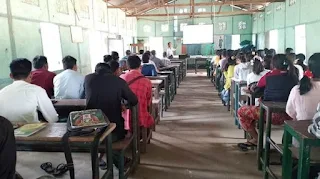According to the Military Council Education Ministry, there are about 50,000 schools (48,753 schools) across the country, of which 13,700 schools have been closed. Among them, more than 4,000 schools (4,226 schools) were closed this year in Sagaing, where the fighting is fierce.
Even though there are self-supporting schools, they cannot study well because they are afraid of the air and heavy weapons.
"During the current revolution, there are really many students who are losing their right to education. "
U Htay, a resident of Minking Township, said that he is worried about young people losing their right to education.
"Children also suffer a lot. Today's young people, who will become adults one day, are being cut off. We see that the potential of these children to become good people in the future is being cut off."
Similarly, in Chin State, which has more than 1500 schools (1551 schools), only 38 schools can be opened. This is very sad, said a parent of a student from Titian.
"It's very sad that we can't open a school in Titin City. Because it seems like the children's education path is blocked. I see that as a very sad thing for the children's future."
Except for Yangon and Irrawaddy, all other districts and provinces have closed schools due to fighting.
Although the National Unity Government (NUG) has opened schools in accessible areas, lives are in danger due to air and heavy weapons, said NUG Deputy Minister of Education Dr. Sai Khaing Myo Tun.
"During the current revolution, there are really many students who are losing their right to education. On the other hand, NUG education schools are now open and accepting students. However, the lives of students, teachers, and students are in danger due to the military council's airstrikes in ground schools."
There are more than four thousand schools (4382 schools) opened by NUG nationwide.
The Karenni Interim Administration Council (IEC) has opened more than 400 schools in Kayah State (Kareni State), where the military conflict is raging. IEC Secretary (2) Kobanya said that it is not because the education system collapsed during the war.
"One thing is for sure, the loss of Myanmar's education system destroys the ability to develop and live together in harmony. Therefore, there will continue to be wars, social wars, and socio-religious wars in Myanmar. Without harmony, respectful communities that can accept each other will not appear. Because it cannot appear, Myanmar may continue to suffer from bad wars and socioeconomics."
According to data from the Ministry of Education, before the coup, there were nearly ten million students enrolling in elementary schools every year, but this year there are only nearly seven million.
The United Nations Office for the Coordination of Humanitarian Affairs (UNOCHA) also stated in a June 11 report that attacks on schools have resulted in the loss of educational infrastructure and children's access to regular education.
According to UNOCHA's report, more than 4.5 million people across Myanmar are in need of educational assistance.






That's disappointing!
ReplyDeleteInformative
ReplyDelete